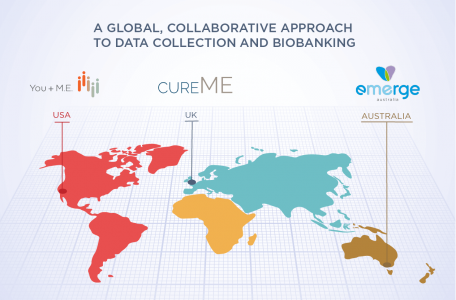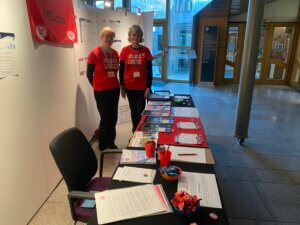Listen to the article:
Australia is establishing its first national ME/CFS biobank and patient registry, thanks to a $1 million grant from The Mason Foundation. The grant consists of two components: the biobank and patient registry, and a research project which uses the samples stored in the biobank. This is significant news for the Australian ME/CFS community, and has been picked up by mainstream media.
“In many studies of ME/CFS, the sample groups are small. But by creating the Biobank and bringing the various research teams together we can share the work – and share the data,” said Professor Paul Fisher, Head of Microbiology at La Trobe University, who is leading the project. “Eventually we will also discover what we hope will be new ways to address this debilitating condition.”
The patient registry will utilise the latest technology available, enabling patients to register and track their symptoms via SMCI’s ‘You + ME’ app. This will allow researchers to access standardised, anonymous information about patients’ symptoms, which can be analysed for a more detailed understanding of the condition and how symptoms change over time.
Access to well-characterised samples and ongoing data from the patient registry promises to be an invaluable resource for researchers.
The biobank and patient registry will be led by Emerge Australia, partnering with the Australian Red Cross Blood Service, Solve ME/CFS Initiative (SMCI) in the US, and the UK ME Biobank (UKMEB), making this a global project. This innovative project will make use of existing Australian Red Cross Blood Service resources, and will also benefit from the infrastructure of the UKMEB and resources being developed by SMCI.
The grant will also support a collaborative research project involving several institutions (see full list below). This project, led by Professor Paul Fisher, Head of Microbiology at La Trobe University, will use the blood samples stored in the biobank and data from the patient registry.
“Here at La Trobe we have discovered a specific defect in the mitochondria – the ‘powerhouse’- of the cells of ME/CFS patients and are working towards a simple diagnostic blood test,” Professor Fisher said.
“Our research is part of a global research effort to better understand the disease process, to develop diagnostic tools and to discover effective treatments.
Professor Peter Schofield AO, Chair of the Mason Foundation’s National Medical Advisory Panel, explained: “The development of a single, global registry which links together the data from many Biobanks enables all researchers in this area to access a huge sample of data and specimens from people who live with this condition globally, and to run tests and checks against a control data set of people who don’t.”
The Mason Foundation was established in 2003, following a bequest from Judith Mason, who lived with ME/CFS. The foundation funds research into ME/CFS and Alzheimer’s disease in Australia. The Mason Foundation is the largest funding source for biomedical ME/CFS research in the country, having distributed $10 million in research funding over the past 10 years, dwarfing the Australian federal government’s contribution of $1.63 million.
Partner Institutions for the Australian ME/CFS Biobank and Patient Registry
Chief Investigators:
Dr Heidi Nicholl, CEO, Emerge Australia.
Professor Paul Fisher, La Trobe University.
Co-investigators are from:
Australian National University (ANU).
Bio21/University of Melbourne.
BC Women’s Hospital in Canada and London School of Hygiene and Tropical Medicine (LSHTM).
Macquarie University.
Murdoch Children’s Research Institute and Victorian Paediatric Rehabilitation Service.
Open Medicine Foundation (OMF).
Solve ME/CFS Initiative (SMCI).
UKMEBiobank (UKMEB) & LSHTM.
To receive updates on this project, click to sign up to Emerge Australia’s Biobank and Registry mailing list.







1 thought on “Australia to Launch its First ME/CFS Biobank and Patient Registry”
The problems remain from 1934 Atypical polio and beyond – medicine never corrects its mistakes! M.E. is known to be caused by infection, some more lethal (bacteria) than others as history has proven but ignored in the context of M.E.
Comments are closed.